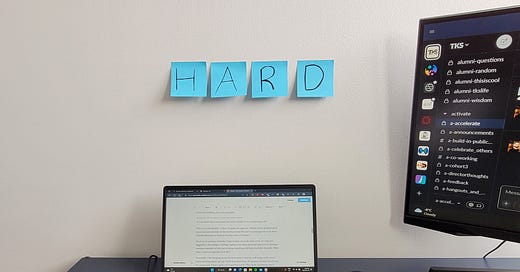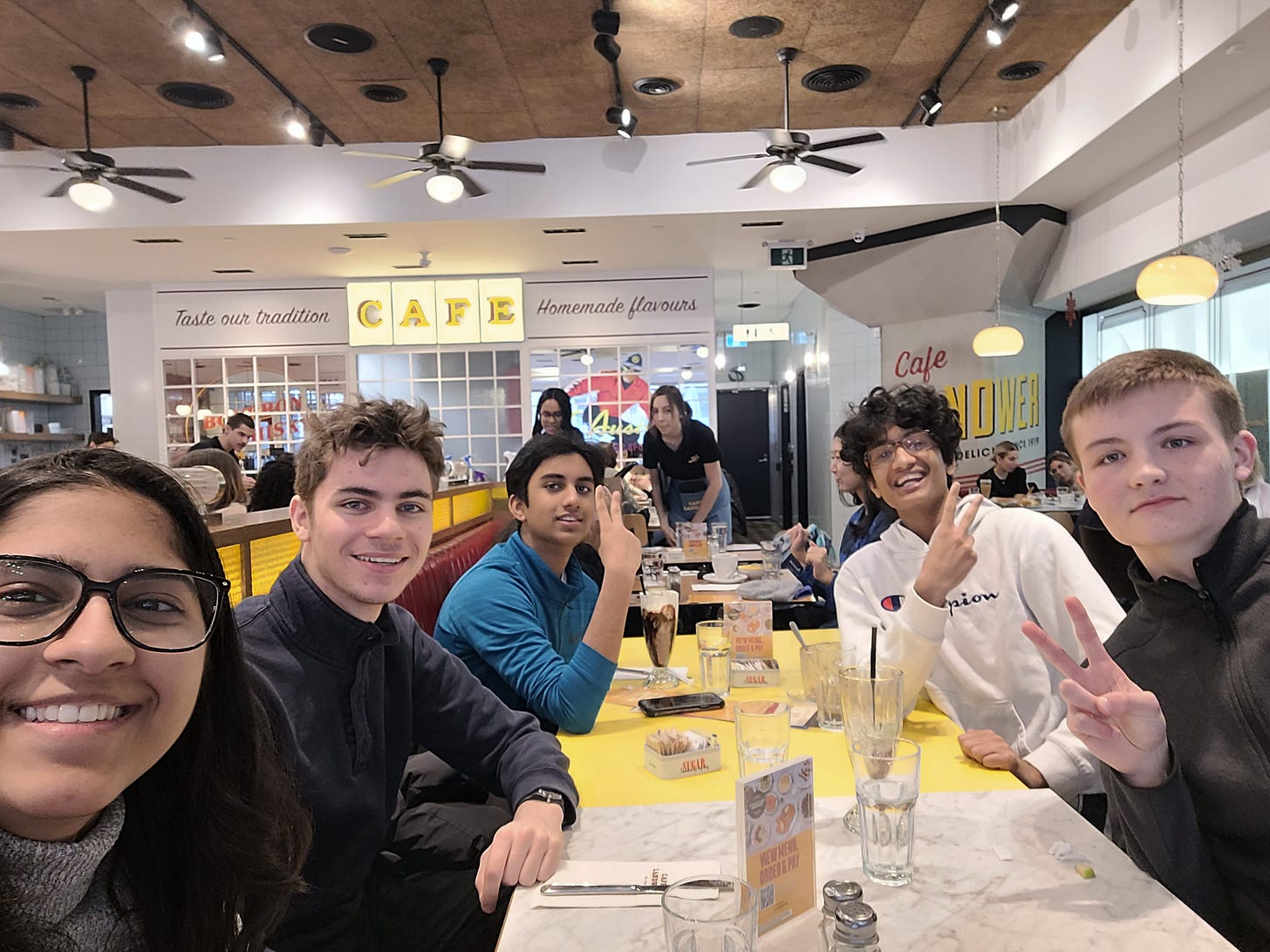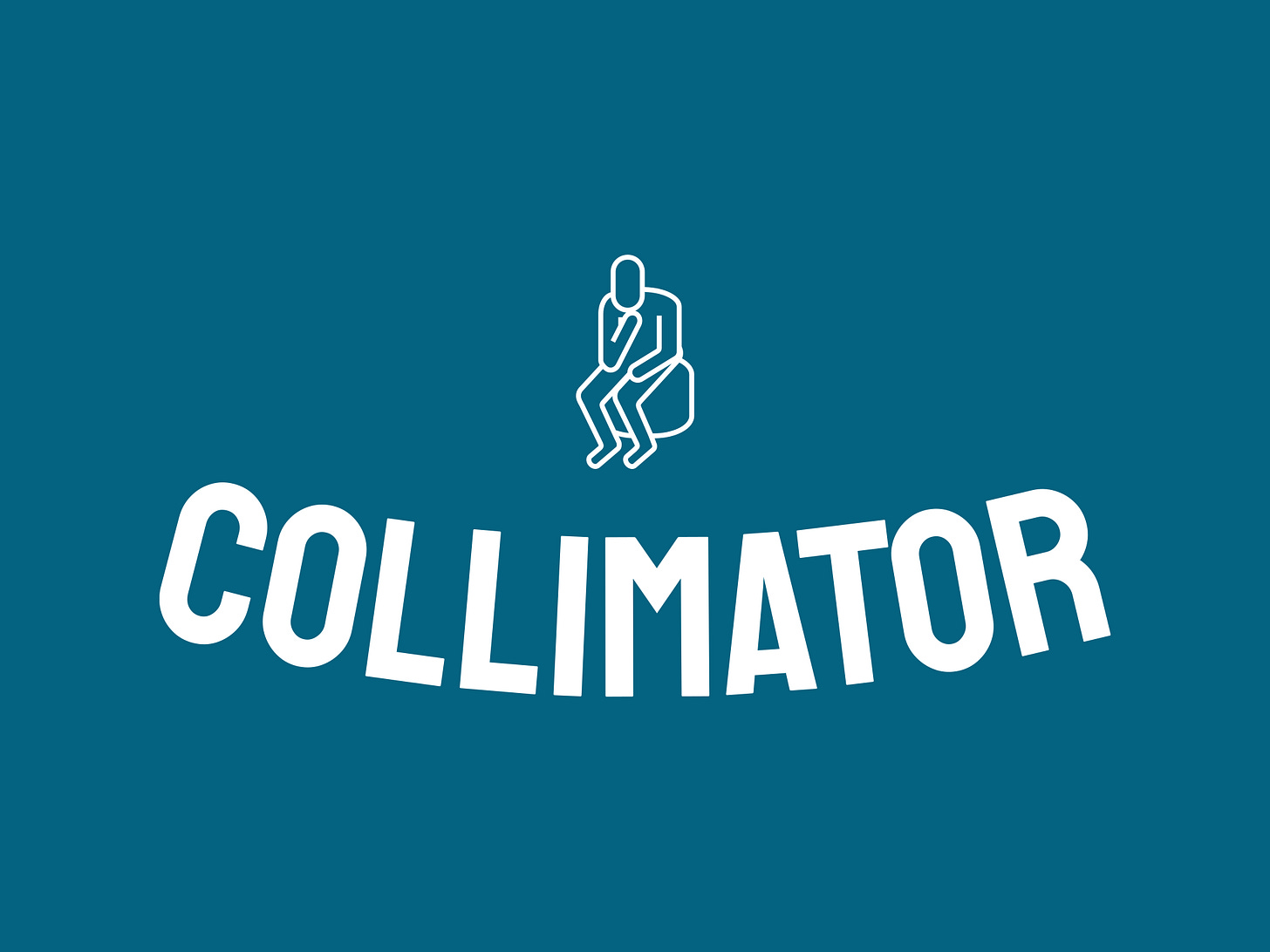Crop Disease, Podcasting, and Fostering Environments of Discipline - Jan. 2023
Hey, I’m Alex. Welcome (back) to my monthly newsletter, where I recap what’s been going on lately both in my life and in my head. I’m currently working in AgTech, looking at ways that humanity can leverage technology to sustain our growth, all while we have less arable land to do so. Hope you enjoy this January 2023 edition!
Discipline
One of the things that I enjoy about Toronto is the fact that it snows in the winter, perhaps to the dismay of my fellow Torontonians. I find that ponderance is much easier - the blanket of white on the fields and the branches of the trees mesmerizes me into the recesses of my mind. Funnily enough, despite my English teacher’s distaste towards Robert Frost for being too mainstream, I convinced her to let us a read a single poem of his:
A Dust of Snow
The way a crow
Shook down on me
The dust of snow
From a hemlock tree
Has given my heart
A change of mood
And saved some part
Of a day I had rued.
Quite fitting for the snowstorm hurling through as I write this. I’ve been thinking a lot about minimizing regret, not letting ‘a day I had rued’ get the best of me. This isn’t limited to just a day, but rather is extrapolated to a week, a month, a year. How do I live a life that I know I won’t regret when I’ve come to the end of it?
I was listening to David Goggins this morning and one of his stories really resonated with me. He mentioned a time early on in his journey when he was running by a cemetery. He looked at all of the headstones and wondered how many of those people had lived a life that they were not proud of. How many people had succumbed to the job they hated, a person they didn’t like, and the average, unexamined and unexplored life. How many of those people had been swept away by the flow of inertia without having had the chance to stop it?
That’s a useful heuristic - one that Marcus Aurelius mentions repeatedly in the Meditations. It’s useful to think of every day as the last one that you have on this Earth. If you dropped dead tomorrow, would you have been proud of what you had done? Is there anything that you would regret not having done? What was holding you back from fulfilling your true potential?
'It is not death that a man should fear, but he should fear never beginning to live.'
This isn’t to be morbid - in fact, it’s quite the opposite. Having such a question gives you a constant reminder of the brevity of your life, and it encourages me to do more, to build character, to learn, to develop, and to be better.
Zoom in on constant reminder. I may inspire you to do some work, or I may not. Regardless, the feeling is fleeting, coming from many personal experiences. Having a constant reminder of why you’re doing something will help you build the habit. What does a constant reminder look like?
Personally, I like hanging up my favourite quotes onto my wall using sticky notes. Every morning when I get up, I look at wisdom from the greatest thinkers of all-time. It’s pretty cool. There’s quite a bit from Nietzsche’s Thus Spoke Zarathustra, but it varies from Jocko Willink’s idea of Extreme Ownership to G. Michael Hopf’s cyclical idea of the world. The idea is to have the entire wall covered, which I’m making some good progress on.
Beyond words, there’s actions. My favourite action reminders are people. I look at them, I talk to them, and I sense the pure ambition they have. There’s nothing more exciting than seeing someone have genuine passion for what they’re talking about. They want to get out there and go get it. And by consequence, a little neuron chain fires off encouraging you to make progress, too. It’s a positive domino effect, going from zero to hero.
This is why the best universities are the best universities. They don’t teach anything that revolutionary or original, but they’re gathering places for the most ambitious and most forward-thinking people in the world. That’s why people are willing to pay so much for these institutions, and why communities like Silicon Valley are prized. When you’re surrounded by people who challenge you intellectually, expose you to new ideas and push you to your limits, your growth is unmatched.
I also find that they’re the people that are the easiest to build genuine connections with. You don’t have to pretend to care about the latest episode of some series or keep up with every single sport. In fact, the differing interests in these communities is what brings the greatest amount of learning, because others are able to synthesize information about complex topics into digestible and understandable chunks, which is a great method for gaining data about the world without the intense effort of research.
These are all systems that we have to set up when we’re active in our thinking - when we’re considering options, outcomes, and optimal solutions. Despite my wishes, we can’t always be brain active. This is why systems of discipline are so important. They’re the things that we can lean into without having to think, that we’ve previously determined are positive in pushing us towards desired outcomes.
Discipline = Compliance
I had a conversation with a few friends on what it means to be disciplined, and one interesting definition that came up was being compliant. When we want to do something, it’s generally quite easy to do it. But what happens when we don’t ‘feel’ like doing the thing. How likely are we to be compliant with the system of discipline that we’ve set up for ourselves?
Obviously, building any habit is going to require effort from the mental end, but there are ways that we can make building habits easier. One thing that I’ve found to be particularly helpful is building environments in which compliance is the status quo.
What do I mean? Let’s say that you’re faced with the average teen’s dilemma: studying for an exam tomorrow (which I should probably get to soon) or playing videogames. In this case, it’s very easy to play video games for the instant dopamine hit and leave the studying for later. But what if you didn’t have the option to play videogames, by deleting the games off of your computer or selling your console?
This is exactly what I mean by building systems where compliance is the norm. It becomes the status quo because it’s the only thing there is to do. It just so happens that this one thing is aligned with your long-term vision for life. The more consistently you do something, the more rapid your growth.
What’s great about this is that you quickly realize just how much importance your brain has been placing on things that don’t really matter. I’ve embarked on a dopamine detox, and one thing that I hadn’t realized I needed so much was music. After driving around with nothing playing and navigating the Toronto subway in the height of winter without the sounds of a guitar reverberating through my earbuds, I felt strangely empty.
It’s always the little things that add up. Music, social media, and movies drive us away from noticing the minute, but once they’re gone, you gain so much more happiness from interacting with someone, going to the gym, and connecting with nature. Perhaps most importantly, you’re able to allocate more dopamine to your work, making it feel more pleasurable and giving you more motivation to do it.
Takeaway: Remind yourself of memento mori, build community, and reset dopamine allocation.
Collimator
A good friend (Unmol) and I have recently started a podcast, Collimator. The name is of my own invention, which I like to think is quite creative: focusing a beam of knowledge to our listeners. Everybody and their aunt has a podcast, so we want to make ours not only different, but high-quality content that a variety of listeners can enjoy.
We’re focusing on the intersection of technology and philosophy. We’re aiming for the right mix of depth and accessibility, explaining a technology and doing a deep dive into it. We’re also prioritizing getting high-quality guests on the show. Within the first two episodes, we’ve had a PhD researcher and a retired army captain share their knowledge, with more on the way.
I think that the best way to learn something is to have it explained by an expert, toned down to a basic intuition (see Feynman Technique), which was one of the original motivations for this podcast. Enabling that ease of access to the general public is incredibly important, as the more educated we are, the better choices we’re able to make.
Check out the first two episodes here (third drops Sunday):
Quanta: Unveiling the Secrets of the Cosmos
The Balance of Pleasure: Understanding Epicureanism in the Modern World
Podcasting is a lot more nuanced than it might seem. From hosting the RSS feed to getting the mic quality to a manageable level, there’s more to it than meets the eye. All-in-all, a single episode is up to 5 hours of work with recording, editing, etc. I spent most of my afternoon on Sunday trying to migrate platforms and removing duplicate listings, which was a pain to say the least.
If you’re going to put in that time, you have to have good content that people will listen to. But it’s more than that, you have to make content people want to listen to. That’s the difference between the good and the great.
Take All-In for example. To me, it’s the one podcast that I’m genuinely always looking forward to listening to, and the day a new episode drops, I’ll put it on in the car. But why am I so excited to listen to it? I can think of a few reasons off the top of my head:
There’s a synergy between all of the hosts, and you’re joining in on the conversation as a friend rather than a listener. The energy is very relaxed, and you’re able to enjoy the conversation much more as a consequence.
There’s a good mix of humour and relevant, interesting content. You’re never overloaded with information, but you’re still gaining perspectives from the behind-closed-doors conversations of Silicon Valley.
The hosts are all inherently thoughtful, due to their wide range of perspectives and the nature of their business. Nothing is ever said for the sake of saying something - there’s intention behind every response. This is what makes you want more when you’re done with an episode.
The question to me is - how do I make sure to incorporate all of these aspects into a podcast?
The most obvious one is time. People have synergy with each other because they’ve spent time together, with both co-hosts and guests. Once you’ve spent enough time filming content together, there are subtle cues that you can pick up on, when someone wants to say something or add to the conversation. This isn’t always as obvious when recording virtually, but it’s an important skill to have.
The second one is being intentional about what aspects you want to improve, and iterating off of feedback. This is how basically any business improves. One thing I need to be intentional about is asking a layer deeper. The surface-level questions will always be there and are the easier option, but that isn’t what leads to interesting conversations. What people really want to have is the insight that only an expert can have on the field, and that’s why so many people listen to shows like the Huberman Lab or The Knowledge Project.
Like anything worth pursuing in life, it’s still a work in progress. Iteration leads to great things.
AgTech
I’ve been exploring the AgTech space for the last few months. I think this is one of the ‘untapped’ markets that will hit the media in the next 3-5 years. We’re already seeing exciting technologies like self-driving tractors and ‘killer-weeders’ being deployed, but they largely go unnoticed in contrast to other AI-based technologies like ChatGPT.
While I agree that ChatGPT and the like will have a major influence on our productivity, the jobs of the future and the way we interact with one another, we still haven’t realized just how transforming technology-enabled farming will be. Think back to when the first plow was invented, or the creation of the Haber-Bosch process to create artificial fertilizer. Both of these technologies fundamentally revolutionized human life, with the former enabling the formation of cities and the later fuelling the two greatest wars ever known to man.
The fundamental understanding is that we’re going to have more people on Earth, which means we need to produce more food, or save more of the food already going to waste. We need to farm more productively with less arable land available due to changing climate factors. We also need to make sure that our farming practices are sustainable in the long-term, otherwise we risk making the same mistakes that led to the Dust Bowl that plagued North America in the 1930’s.
Beyond the implications of the future, there’s the issue of what’s happening right now. Despite all of our massive strides in economic development and modernization over the course of the 20th and 21st centuries, there are still more than 800 million people in the world that go hungry every single day. It’s insurmountably difficult to visualize just how many people 800 million looks like, we’ve really never seen 800 million of anything in our lives. One method that puts this problem into scale is to take all of Europe and imagine it as suffering from severe food insecurity, plus some extra. Insane.
One visualization to understand what that distribution looks like is the WFP’s HungerMap:
After exploring potential solutions in the most affected areas, I found that they all featured a commonality: conflict. It mediates food production and distribution in aspects that many have not even considered, whether it be the loss of production on the ground due to intimidation and physical conflict destroying cropland, to logistics routes for food distribution. It’s extremely difficult create real, lasting solutions to hunger while conflict remains in a country.
All of these factors lead to an answer - increase production where it is possible, while reducing waste as food progresses down the value stream. This sounds rather abstract, but there are concrete issues that we can focus on:
Crop disease still causes losses of 6-10% of total yield, while in developing countries this number reaches as high as 60%.
17% of food gets wasted, whether it rots in storage post-harvest or is thrown into the trash post-consumer purchase
20-40% of global food yield is lost due to pest infestations
Along with many, many more…
I’ve been focusing on that first point, with the basic thought that increasing global yield will relieve the immense strain on global prices, allowing nations that rely on imports (often the hungriest) to have cheaper access to high-quality, nutritious foods. By providing a base-layer, breaking out of the cyclic poverty the world experiences will prove somewhat easier.
I’ve focused specifically on corn, due to it being one of the most-consumed foods in the world, along with playing an important role to feedstocks for animals and a key ingredient to ethanol. I dive deeper into the root-cause analysis behind the decision and potential improvements to corn disease diagnosis here:
The Global Food Crisis: Addressing Disease with Computer Vision
To go along with the article, I also created a video for a verbal explainer to my reasoning, as well as to test my content creation skills with artistic vision, video editing and making content people actually want to consume. Check out the video here:
Solving Hunger in the Congo - CV for Corn Disease
I have a new-found appreciation for video-editors, hats off you.
Exciting Outlook for the Next Few Months
I’m finally finished with exams, which means I can once again look forward to what’s important in my life:
Speaking at SXSW - I’ll be there from March 10th to March 15th. If you’re there and would like to meet up, shoot me a DM on Twitter or a quick email and I’d be glad to set it up.
Starting a month-long consulting challenge with a large corp. More details on this next month, so stay tuned.
Building out AgTech project - I’ve been connecting with mentors in the field and a new semester means more time to push progress, day-on-day, week-on-week.






